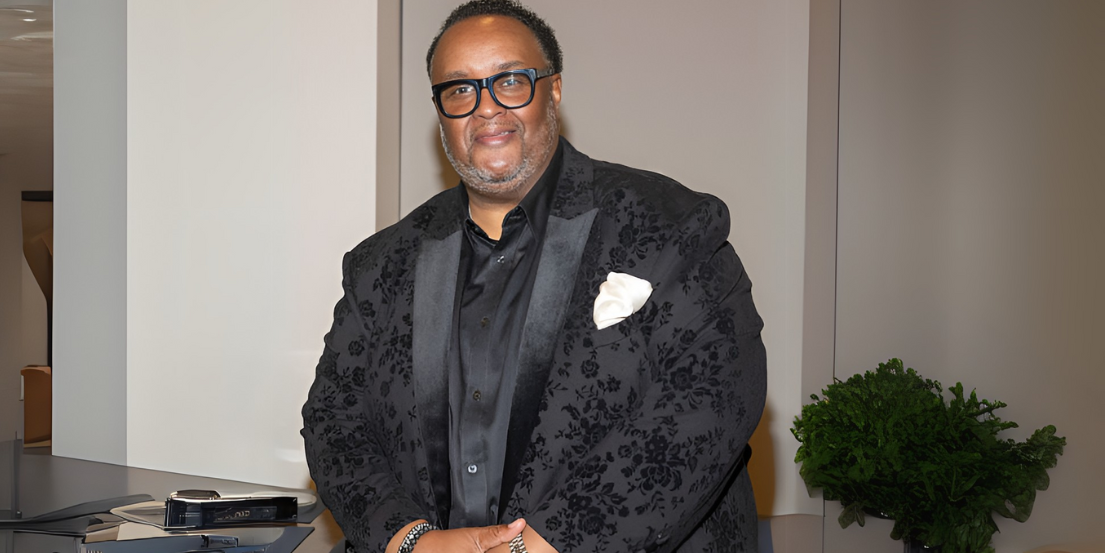
Throughout the month of June, the GMA is celebrating all things Black music. We had the opportunity to sit down with industry veteran Percy Bady and hear about his history with Black music and the groundbreaking genre of Gospel music.

Tell us about your history with music in the Christian and Gospel space.
My history started as a piano player with the Reverend Milton Brunson and the Thompson Community Singers in the late 70s and then evolved into writing songs for the choir. The song I wrote at 16 years old was “There’s No Way.” It’s become a staple in the Gospel community and was my introduction to this whole thing. Eventually my cousin, who was an NBA basketball player, introduced me to the Winans and through them I met Andrae Crouch, who was a songwriting hero to me. Through him I met Bill Maxwell, his producer. I loved all the records Bill was doing. Bill was also responsible for producing the early CCM father Keith Green. I got a chance to spend time with Bill who played me all these Keith Green records, which is where I developed an affection for songs outside the Gospel space. That’s when I started loving Carman and Sandi Patty and different artists, anyone who had great songs. CCM songs were so well written and theologically sound. There was a foundational thing to them like we were doing in Gospel as well. A lot of what we wrote in Gospel was our experience. In context, it had to have balance and be truthful to what the word of God said as well.
I never wanted to have an artist career because I saw so much in the industry that was required and I thought, nah, I’ll be the guy that writes the songs and provides the records and plays the music. I had a manager who was pitching me to get a production publishing deal. When I would turn in the songs for that deal, the company would say, hey who’s singing these demos? They should be the one doing this. But I wasn’t interested. They said I could do Quincy Jones model, or David Foster – two heroes of mine. I said, okay maybe I could do something like that. I signed with GospoCentric Records. The Percy Bady Experience was my first solo record. That began a journey for me that was filled with mixed emotions because at the time there was quite a few personal battles going on in my family and things that were happening that were very challenging for me. To focus on being on the road was tough at times but I found my strength in leaning on my relationship with the Lord and the songs that were being birthed from the challenge we were facing. I call it a gift and a curse because it never turns it off. There’s always a song behind it. It happens naturally, not something I try to do.

What defines the Gospel music genre?
I think it’s the experience that defines it. You can’t sing or write about somebody you don’t spend time with. I equate it to a relationship between a husband and wife. A husband can’t talk about his wife if he doesn’t spend time with her. The nature of our relationship with the Lord and walking with him, that faith walk, the learning to walk by faith and not by site, learning to trust Him when we don’t see his hand. We have to trust His word.
How is Black music influencing culture today?
I think it gives hope. It’s still the message of hope. When people think about church and their mom and their grandmother, those Saturday evenings or Sunday afternoons when grandma is cooking and hearing her sing songs of faith, those memories remind us the importance of keeping a song. A lot of people have lost their songs. When the scripture says, Sing unto the Lord a new song, it means sing what’s in your heart. A lot of times when I heard my grandmother or my mother singing, it was a song that was in her heart in the moment. That is a reflection of a relationship with the Lord. You understand where your strength comes from and your faith comes from.
For someone new to Gospel music, where is a good place to start?
Start studying those who have come before you. It’s always great to want to do something but it’s more important to understand who did it before you, who came before you, why it was established. It’s important to understand what being devoted really represents. It’s hard to know where you’re going if you don’t know where you come from. I’m grateful I stand on the shoulders of the greats like Andrae Crouch and Walter Hawkins and James Cleveland and so many others. What they did helped pave the way for me to be doing what I’m doing today.
About Percy Bady
Percy Bady is a Chicago native and a preacher’s son who became one of the most successful gospel songwriters and studio session players of the 1990s. He began to play the piano at the age of three. As a young adult, his first major gig was playing piano for Chicago’s legendary Thomspon Community Choir, arguably the most popular urban choir of the 1980s.
Then, Bady’s first official recorded credit was playing organ on Rev. Ernest Franklin’s Beautiful Tomorrow LP in 1983. Soon, he was writing songs, playing keyboards or producing songs for both Gospel and R&B superstars. Among them are Whitney Houston, Common, Bebe & CeCe Winans, Marvin Sapp, Toni Braxton, Fred Hammond, Jennifer Holliday, Donnie McClurkin, Tasha Cobbs Leonard, and Michelle Williams, among many others.
Bady is also an uncredited co-writer of R. Kelly’s platinum-selling ballad “I Believe I Can Fly” from the 1997 film, Space Jam. However, he was credited as the keyboard player and the director of The Luv Club Choir that sang background vocals on the now iconic track.
Bady has also released two solo albums, The Percy Bady Experience in 2003 and Kingdom Inspirations in 2013. The latter earned him a Grammy® Award nomination in the category of Best Gospel Song for “Still” which featured vocals by Isaac Carree. In 1999, Bady picked up a GMA Dove Award for Traditional Gospel Recorded Song of the Year for co-penning Yolanda Adams’ classic “Is Your All on the Altar.” He has also won four prestigious BMI Music awards for composing songs for Joshua Rogers, Antwaun Stanley and Smokie Norful.
##




.png?width=352&name=BlogPress%20Release%20Template%20-%20Hubspot(3).png)